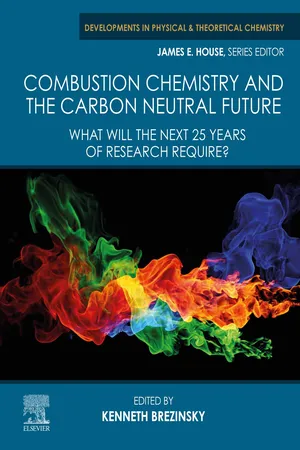
Combustion Chemistry and the Carbon Neutral Future
What will the Next 25 Years of Research Require?
- 660 pages
- English
- ePUB (mobile friendly)
- Available on iOS & Android
Combustion Chemistry and the Carbon Neutral Future
What will the Next 25 Years of Research Require?
About This Book
As the demands for cleaner, more efficient, reduced and zero carbon emitting transportation increase, the traditional focus of Combustion Chemistry research is stretching and adapting to help provide solutions to these contemporary issues. Combustion Chemistry and the Carbon Neutral Future: What will the Next 25 Years of Research Require? presents a guide to current research in the field and an exploration of possible future steps as we move towards cleaner, greener and reduced carbon combustion chemistry.
Beginning with a discussion of engine emissions and soot, the book goes on to discuss a range of alternative fuels, including hydrogen, ammonia, small alcohols and other bio-oxygenates, natural gas, syngas and synthesized hydrocarbon fuels. Methods for predicting and improving efficiency and sustainability, such as low temperature and catalytic combustion, chemical looping, supercritical fluid combustion, and diagnostic monitoring even at high pressure, are then explored. Some novel aspects of biomass derived aviation fuels and combustion synthesis are also covered.
Combining the knowledge and experience of an interdisciplinary team of experts in the field, Combustion Chemistry and the Carbon Neutral Future: What will the Next 25 Years of Research Require? is an insightful guide to current and future focus areas for combustion chemistry researchers in line with the transition to greener, cleaner technologies.
- Provides insight on current developments in combustion chemistry as a tool for supporting a reduced-carbon future
- Reviews modeling and diagnostic tools, in addition to key approaches and alternative fuels
- Includes projections for the future from leaders in the field, pointing current and prospective researchers to potentially fruitful areas for exploration
Frequently asked questions
Information
Table of contents
- Cover image
- Title page
- Table of Contents
- Copyright
- Contributors
- Introduction
- Chapter 1: Combustion emissions, internal combustion engines and greenhouse gases
- Chapter 2: Soot research: Relevance and priorities by mid-century
- Chapter 3: Natural gas for combustion systems
- Chapter 4: Sustainable bio-oxygenate fuels
- Chapter 5: A comprehensive perspective on a promising fuel for thermal engines: Syngas and its surrogates
- Chapter 6: Hydrogen, the zero carbon fuel
- Chapter 7: Ammonia as an alternative
- Chapter 8: Small alcohols as biofuels: Status and needs for experimental data, theoretical calculations, and chemical kinetic modeling
- Chapter 9: Fischer-Tropsch and other synthesized hydrocarbon fuels
- Chapter 10: Low temperature combustion
- Chapter 11: Supercritical CO2 fluid combustion
- Chapter 12: Catalytic combustion for cleaner burning: Innovative catalysts for low temperature diesel soot abatement
- Chapter 13: Advances in chemical looping combustion technology
- Chapter 14: Chemistry diagnostics for monitoring
- Chapter 15: High-pressure spectroscopy and sensors for combustion
- Chapter 16: Bio-derived sustainable aviation fuels—On the verge of powering our future
- Chapter 17: Using combustion synthesis to convert emissions into useful solid materials
- Index